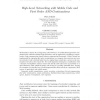148 search results - page 13 / 30 » Living it up with a live programming language |
SP
2003
IEEE
14 years 20 days ago
2003
IEEE
Language run-time systems are often called upon to safely execute mutually distrustful tasks within the same runtime, protecting them from other tasks’ bugs or otherwise hostile...
CC
2010
Springer
14 years 2 months ago
2010
Springer
Abstract. Following the translation validation approach to highassurance compilation, we describe a new algorithm for validating a posteriori the results of a run of register alloc...
CORR
2004
Springer
13 years 7 months ago
2004
Springer
We describe a scheme for moving living code between a set of distributed processes coordinated with unification based Linda operations, and its application to building a comprehen...
ASPLOS
2006
ACM
14 years 1 months ago
2006
ACM
Clustered Objects (COs) [1] have been proven to be an effective ion for improving scalability of systems software [2, 3]. But can we devise a programming model that would allow CO...
OOPSLA
2007
Springer
14 years 1 months ago
2007
Springer
Live Sequence Charts (LSCs) is a scenario-based language for modeling object-based reactive systems with liveness properties. A tool called the Play-Engine allows users to create ...

